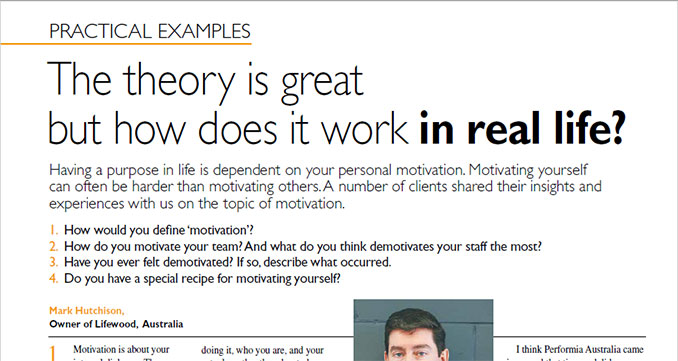
The theory is great – but how does it work in real life?
Having a purpose in life is dependent on your personal motivation. Motivating yourself can often be harder than motivating others. A number of clients shared their insights and experiences with us on the topic of motivation.
- How would you define ‘motivation’?
- How do you motivate your team? And what do you think demotivates your staff the most?
- Have you ever felt demotivated? If so, describe what occurred.
- Do you have a special recipe for motivating yourself?
Mark Hutchison,
Owner of Lifewood, Australia
- Motivation is about your internal dialogue. The more in balance I am in my life, the more I’m able to overcome situations – we’ve got adversity coming at us all the time, and I think when we’re out of balance, controlling the negative dialogue in our head is difficult.
When I’m demotivated, it’s because I’m blaming someone else for my circumstances. So, if I can actually take 100% responsibility for my circumstances, I’m actually quite motivated.
My definition of motivation is the ability to constantly move forward. If you’re motivated, you seem to be moving forward towards something. At the times when I’ve been demotivated, it’s when I’ve lost sight of my goals. It’s when I’ve lost sight of the endgame, I’ve forgotten why I’m doing what I’m doing. And knowing why you do what you do, is the backbone of motivation. Motivation is quite often skin-deep for a lot of people. This is why I don’t go to motivational speakers. I am internally driven from a sense of purpose.
Motivation is knowing what you’re here to do, why you are doing it, who you are, and your actual worth – there has to be a sense of self-respect.
- I need to be the “positive energy guy” in the room. So, if my motivation is down, my team is down. One of the things that’s been a big game-changer in motivating my team is creating targeted games. Having individual targets in place. What motivates the team is knowing their product really well, knowing their targets within the game and knowing what their reward will be.
And what demotivates people the most? Shifting goalposts, shifting rules, not knowing the rules. Not knowing the game, not knowing how to win, being talked about behind their backs, feeling unsafe and not feeling like they’re trusted. All the negative things about culture, gossip, office politics, playing favourites. All that stuff is negative. - Yeah, absolutely. I spent five years on the edge of bankruptcy. In October 2018, I was half a million dollars in debt. And I had no results, no sales orders, and a company culture that was nothing short of toxic. I had had a fully operational business that was worth $5 million, but by 2019, it was in the negative to half a million dollars. I was broke, I had no personal assets.
Why? As a result of bad hires. We had got ourselves in a situation where we had a toxic culture, poor manufacturing quality and warranty issues.
I had a toxic general manager, I had warranty problems coming up, I also had a timber mill losing a million dollars a year that could not be resurrected, because the technical challenge was just too much.
And on top of that, I was a single parent with two small children, a five-year-old and a seven-year-old, of which the five-year-old had every conceivable allergy you could possibly imagine.
I think Performia Australia came in around that time and did some internal evaluations of my team.
We now had a very exciting opportunity in front of us. We changed the team around and solved the product supply issues. Our product was now on spec, on price and arriving at the right time and in the right quantity.
We exited our manufacturing from China and set up world-class, quality products by training manufacturers in Vietnam to make a highly technical product.
We’ve now got a culture that re-energizes the entire company. We started this year with a robust stock holding, robust team, robust cash flow, robust cash reserves, robust systems and a very exciting, strategic future. And we’ve got an international patent that has been revised and accepted. - I think the challenge of motivation lies in the mind. But there are external things you can do to assist in motivating yourself. For example, if you take care of your body by getting enough sleep and eating a well-balanced and nutritious diet, then you are less likely to become depressed and demotivated.
Michaela Pojezdna
Director of Deckard & Penfield s.r.o., Czech Republic
- To know and to believe that what I do has a purpose.
- Let’s start with the second question. You can easily demotivate an employee. It’s enough if you stop respecting the person, take the person for granted, or you just don’t talk to the person enough. Not knowing what is happening in the company and the inability to influence things can be very demotivating. But I have to say that I have a fantastic team that is very experienced and is a pleasure to work with. I am in contact with my team daily. We update each other on our work every day, and I create opportunities for joint decision-making. It is very important for every member of the team to know what is expected of them, and for them to understand their respective roles in the company and what value they add. Personal acknowledgement, even though it sounds clichéd, is still the biggest motivator for healthy team spirit.
- Yes, definitely, and not only once. I really like things to be done exactly as I imagine they should be done. However, the reality is sometimes different. We are working with a range of staff, which brings many variables into the workplace, and that can sometimes be demotivating to me personally…
- I wouldn’t say I have a recipe. I do things that I enjoy doing and not the things I dislike doing. And maybe I am lucky in that there are few things that I don’t enjoy doing, so there is no need to search for motivation. I am still enjoying doing recruitment.
Tibor Berszany
GM of BERTIS GROUP,
Romania, 1,200 employees
- The individual’s willingness to work, to perform, and to reach his/her objectives.
In my view, if a person is solely focused on surviving from one day to the next, such a person will be difficult to motivate to give an outstanding performance.
- Of course, financial motivation is important, especially in positions where pay is linked to performance. However, in my experience, professional and personal acknowledgements are more important, as well as the opportunity to develop, and to advance in one’s career. And what demotivates employees the most? If the employees do not feel accepted in the team or feel underappreciated by their boss, or the atmosphere in the workplace is unpleasant. Then it isn’t possible to perform even with financial motivation.
- As I mentioned before, motivation is completely personal and internal. Therefore the reason for losing your motivation is a personal matter, such as a family conflict, or a feeling of hopelessness. I have become demotivated on occasion when there was a family conflict – my motivation fluctuated for a few days, I felt there was no point in pushing myself …. but since I generally am a positive person, I soon overcame those ups and downs.
- You should always do what you are passionate about. Let your work be your hobby too!!
Set goals for yourself and enjoy the journey.
